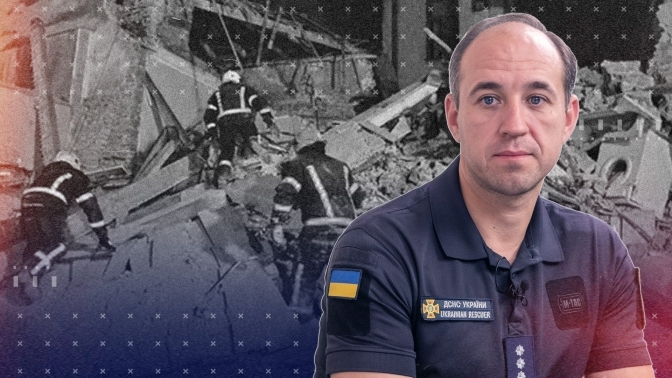
[For urgent updates please follow Ukrainian Freedom News on Telegram]
On September 7, the testing of the «Cell Broadcast public» notification system began in Ukraine. Would you please explain what’s new in it and how it functions?
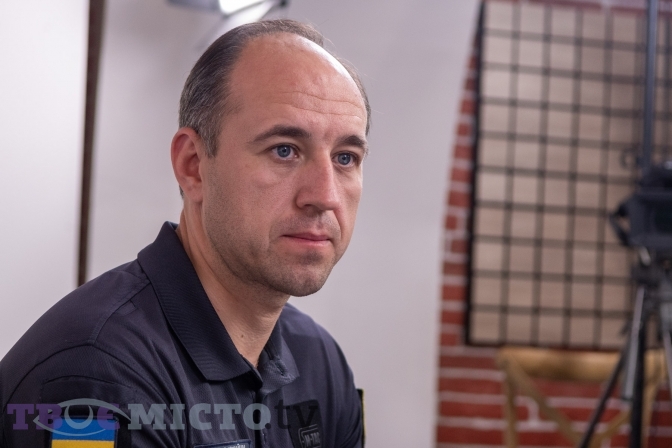
The new alarm system was previously tested in the Poltava and Donetsk regions, where the emergency personnel worked out interaction and adjustment of information. On September 7, testing began on the entire territory of Ukraine. This system allows you to receive messages with a specific sound and vibration to any phone connected to the GSM network [Global System of Mobile Communications], regardless of the mobile operator. After opening this message, users receive information about threats of various types, and after clicking on the link, they see recommendations on how to act.
Testing will take place three times a week until the beginning of October. For now, we will only send text messages. Therefore, it is through this system that only important notifications will be received – about the threat from air, shelling and others. Still, no one can prohibit the installation of applications such as «Air Alarm», which has justified itself because it’s fast and informative.
Until now, in general, we’ve been making announcements through loudspeakers. But this way, we cannot cover the entire territory and notify everyone because there are not many loudspeakers in remote and rural areas.
It happened that some citizens didn’t receive the notification. Do they need to reset the phone?
This is a test mode that lets all operators check how the notification system works, analyze how many users are registered in the networks in general, how many of them received or did not receive messages and why. That is, we are currently adjusting the work, which we plan to complete by the end of September – the beginning of October. Currently, the system works with all Ukrainian operators. If people have returned from abroad and use foreign SIM cards, but their phones are registered in Ukrainian networks, they will also receive messages.
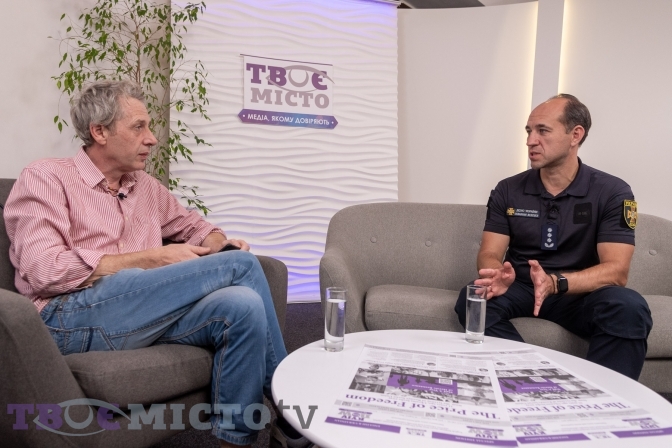
Read also: Repairing the ruins, destroying the stereotypes. Interview with the co-founder of BUR
Can this new system be used to alert non-military emergencies on the local level?
Yes, this system enables us to limit the notification area. For example, to notify residents of the region or even the district in case of evacuation.
Previously, there was information about various types of warning signals which had to be used for missile attacks, possible chemical attacks or nuclear threats, evacuation. Later, it was refuted. So which warning signals are used now?
Currently, everything works as before, no changes are planned. There is only one signal that informs people about the threat. After hearing it, you need to go to the shelter, turn on the radio or television and listen to what to do.
Did the priorities in your management work change with the beginning of the great war?
I wouldn’t say that they have changed dramatically, because since February 24, we’ve been more or less calm. The exception was, of course, for the bombing of the Lviv region. A large-scale fire at a bus depot was extinguished with the involvement of a lot of personnel. Then, we eliminated the consequences of the bombing at other objects. Employees are under much stress because no one knows where the missile might «arrive», what might happen, and what to do. For example, when we almost extinguished the fire at the oil depot, the alarm started again, and we had to stop work because we could not expose the workers to danger. Due to this, they lost time, and the fire spread again. Such cases require additional resources, forces and means from us.
Is your management involved in the development of standards and inspection of shelters?
Yes, our employees were involved in the commission that checked all educational institutions and facilities where children can stay. First of all, we checked whether these shelters are able to protect at least from debris, because we understand that they cannot be completely safe in case of direct impact. Basement or at least semi-basement rooms without windows can serve as shelters. If there are windows, they should be covered with sandbags or blocked with concrete blocks. Each shelter should have a supply of water, medicine, food, and means of communication through which parents can be contacted to let them know that the children are safe.
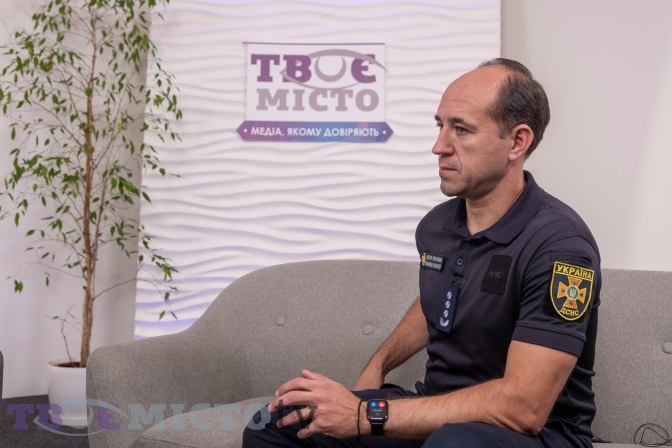
Were there any comments about the facilities?
Some objects had no shelters at all. Initially, we considered the possibility of applying the «two walls» rule, but it was rejected. Then, we found an alternative – shelter in the neighbouring premises. It was recommended that the distance to them be 100-200 meters, but the state construction norms allowed up to 500 meters. For this, the owners of the premises and the institution must conclude a contract or written agreement, so that the persons responsible for children and their evacuation know where these shelters are and how to get to them.
All these things were fixed, because the presence of shelters was the main condition for the beginning of the educational process. If there is nowhere for children to hide, neither teachers nor parents will want to put them at risk.
The «Safety Educator» program has already been introduced in Kyiv. Does it work in Lviv?
Not only in Lviv, but also in the region. Such an educator can be not only an employee of the State Emergency Service but also a policeman. We are doing this work together. Almost every educational institution has an employee of the State Emergency Service who will conduct additional classes, lectures, and participate in public events. Before the school year, we held field trips to almost every district centre to draw children’s attention to safety issues. We taught them how to properly descend into a bomb shelter and wait for an air raid there. For children of preschool and primary school age, we conduct such classes in a playful way – so they remember information better.
Did you conduct them in all schools?
From September 1, «safety educators» visited all schools. We’ve been conducting such classes for many years. For this purpose, school principals with a corresponding letter indicating the date and time when they are ready to receive us should apply to the Main Office or the district offices of the State Emergency Service, and we will come to them according to the schedule.
Are you exploring other shelters?
Mostly, we focus on the simplest ones: basements of residential buildings or communal facilities. Because fundamental shelters are provided only for the working population, which, relatively speaking, remains in the city during hostilities. But since the war has engulfed the entire state, basements have to be used as shelter. In them, the residents themselves or condominiums arrange places to at least wait out the threat. However, we haven’t carried out the examination of all available shelters in the city.
The city is preparing for the heating season, purchasing stoves that can be used for heating large objects or basements of apartment buildings. Are there any recommendations on how to use them properly?
A very interesting question. There are many requirements and recommendations for their installation and use. «Stoves» in the basements of residential buildings are additional safety risks, starting with the selection of these furnaces, their installation, and finishing with the complete removal of combustion products to the outside. After all, it’s an open fire.
Let’s start with the simplest: the stove must be installed on a non-combustible base. If the floor is made of wood, you need to put a metal sheet or a layer of bricks on it. The stove must be tightly closed so that the firewood does not protrude beyond the firebox. Also, the combustion products should not enter the room, because they can be poisoned. In the room that will be heated with a «furnace», there must be a person responsible for lighting it, supervising the work, staying there until the firewood is completely burned. He must check whether everything is safe before he comes out.
Also, a gas analyzer must be installed in the room where the stove is located: this is the only way to find out that carbon dioxide does not accumulate in the basement and that it cannot poison those present there. The pipe through which exhaust gases are discharged must be insulated, but this is provided that it does not heat up to more than 90 degrees. The end of this pipe must be brought outside. If we are talking about a building with no more than two floors, then the pipe should protrude 1.5 meters from the outer wall. And if the building has nine floors, this is unacceptable, because combustion products will enter the apartments on the upper floors through the apartments. I understand that they are closed in winter, but there are still balconies, and not all of them are in perfect order. Any spark from the chimney can cause a fire.

That is, when someone wants to put a «stove» in the house, it’s necessary to contact the State Emergency Service, so that they can confirm that everything was done correctly?
The decision to install it is made by the head of a condominium, residential complex or any apartment building. He appoints a person responsible for it and, roughly speaking, for its operation. Separate consent is not required for this.
The Security Service of Ukraine announced the opening of a series of proceedings in 11 regions of Ukraine, where representatives of the State Emergency Service allegedly organized a criminal scheme: they earned money by falsifying documents on verification of security conditions that did not exist. Did it affect the Lviv region?
Employees of the relevant services conducted investigative actions at us and seized all documents. There is full assistance from the leadership of the region. We are interested in discovering such acts, if they really were. As for work, the administration continues to work, as do the investigative bodies. Currently, we do not have any conclusions, we are waiting for the end of investigative actions.
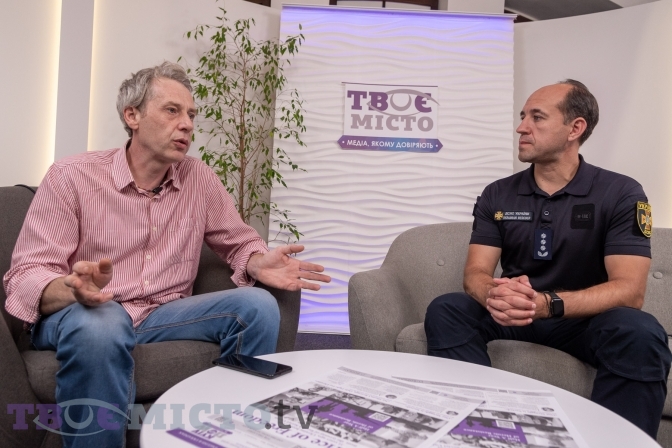
What prevents you from working in the current conditions?
There are some complications, but I wouldn’t say that there is anything stopping us. We work despite the risks and workload, because we have to. And we cope with the assigned tasks.
Are Lviv «emergency personnel» involved in demining territories or disassembling the ruins in the east of Ukraine or near Kyiv?
Currently, only our pyrotechnicians are chosen for demining in the east. In addition, a detachment of Lviv rescuers has been formed, which is ready to go to a designated area for emergency rescue operations during the day, if necessary. However, so far such a need has not arisen. The garrisons are coping, and we are in standby mode.
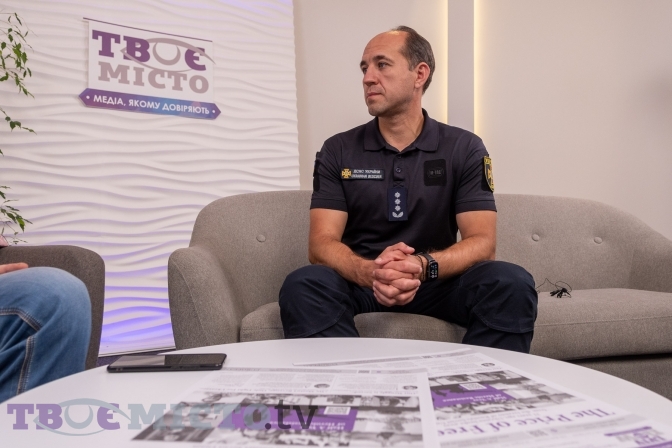
Do you undergo additional training? Do you travel abroad for this?
Yes, the war presents us with additional challenges, so we practice the threat of bombings, collapses, and learn how to work quickly in such cases. We quite often go to training abroad, and those employees who take part in them return to Ukraine and share with us the skills acquired from foreign colleagues.
Sergiy Smirnov spoke
Text: Marichka Ilyina, translated by Vitalii Holich
Photo: Ivan Stanislavskyi, collage: Dmytro Taradayka
Full or partial republication of the text without the written consent of the editors is prohibited and considered a violation of copyright.
Follow us on Facebook and Instagram. Lviv Now is an English-language website for Lviv, Ukraine’s «tech-friendly cultural hub.» It is produced by Tvoe Misto («Your City») media-hub, which also hosts regular problem-solving public forums to benefit the city and its people.




